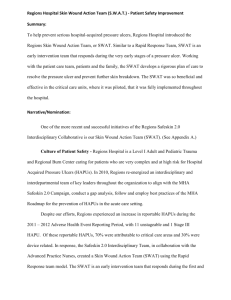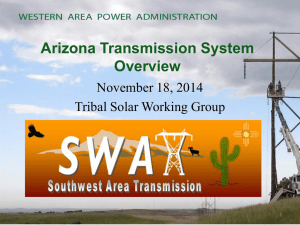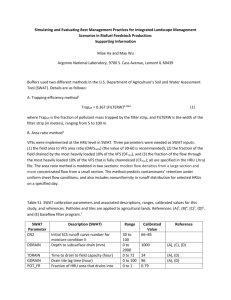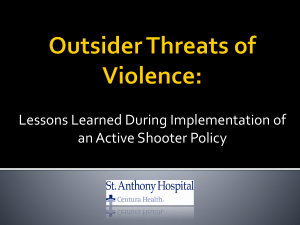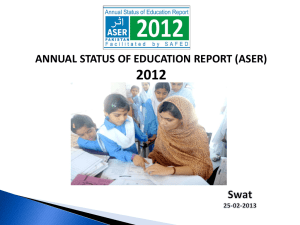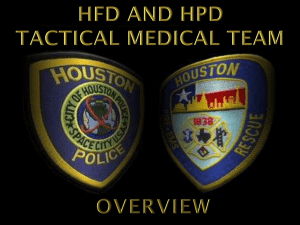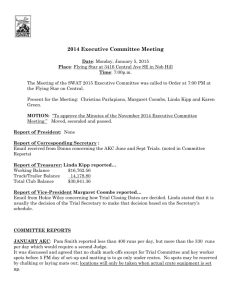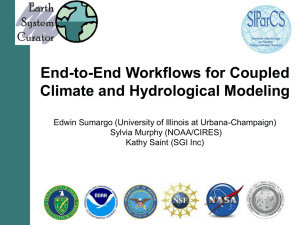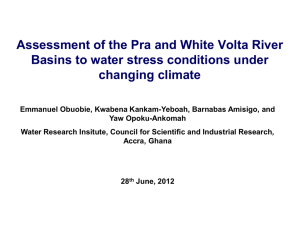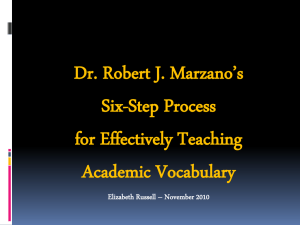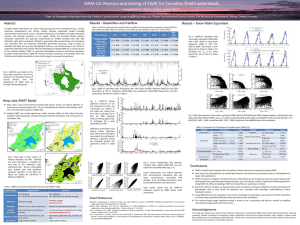Causes of Conflict in Swat Dec 2011 PIDE-3
advertisement
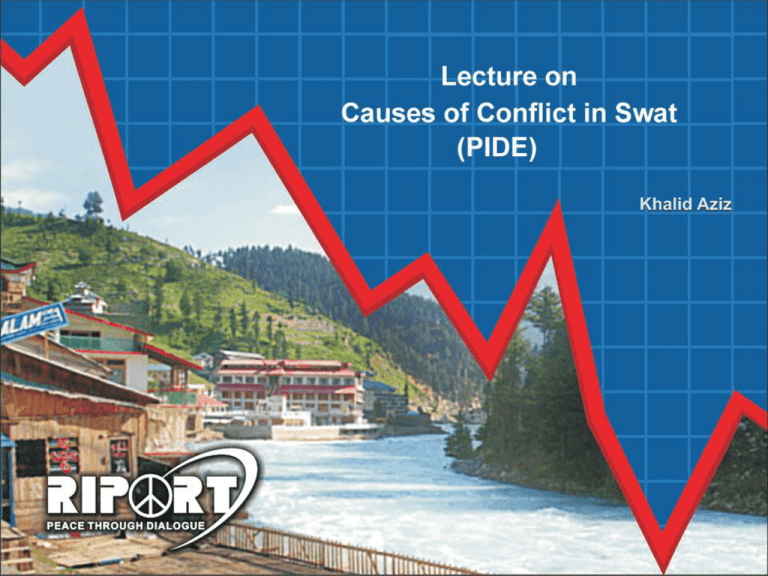
Swat & its People Survey Data • The survey is based on 1998 census of population numbering 1,257,602. • Swat has 65 union councils; Swat Tehsil has 52 UCs & Matta Tehsil 13. • 13 union councils were selected from Swat & 3 from Matta Tehsil. • 384 house holds were selected for random survey with a 5% degree margin of error. • 16 FGDs & 39 key informants were also interviewed. Hypothesis-1 Conflict doesn’t happen suddenly. 1. Deterioration in public service weaken the link with people 2. The poor & marginalized are future recruits for militants. A poor person will be a bad Pushtun 3. Many joined the insurgents because of asset deprivation— particularly land. 4. Years of mis-governance, and inability to provide justice, created platform for militancy 5. The Local Bodies Reform 2001 destroyed district management structure in Swat & provided militants space to grow. The MMA government was supportive. Hypothesis-2 6. There is a close relationship between (some) Madrasah education and militancy. 7. The PATA Regulation 1969 reduced Human Rights and justice in Swat causing weak governance culminating in militancy. 8. Non regulation illegal broadcast through FM transmitters encouraged militancy and strengthened the TNSM and TTP in Swat. The female were more prone to FM broadcasts. 9. The government failed to check the militancy from 2002-2009 it led to the rise of militancy in Swat. Comments on Communication • Pivotal role of Mullah Radio to win support and control society through fair. • Swat mosques were control by Afghan Refuges Mullah’s • FM Radio brainwashed the female who generated support within household. Labor force will increase from 51 million in 2005-06. By 2015 the LF will be 85 million & by 2023 it will rise to 95 million. Comments on poverty 1. Below is a comparison of MDG development indicators of 2001 with 2005 2. In 2001 Swat was 15 out of 24 KP Districts; In 2005 it slipped to 17th position. 3. In Infant Mortality: It was 21 out of 24 (BA) 4. In Malnourishment: Swat was 23 out of 24 (BA) 5. In Primary School Enrollment: Swat was 11th (A) 6. In Adult Literacy: Swat was 9th (AA) 7. In Drinking Water: Swat was 9th (AA) • Poor Infant – Mother care with a migrant father produced child suicide bomber. A Poor Woman An Exploited Child Project “Sabaoon” • Research of 126 child suicide bombers aged 8 – 14 years showed: – Most of the abducted children were picked up at random by militants – 65 to 70% of the children's perform below their pair group in schools – Most of the children were school dropouts or did not attend – 85% of the children were from large families 6 to 16 siblings – They suffered from lack of impulse control and aggressive tendency – They had headaches and hallucination and most suffered from seizures and epilepsy Comments on Governance - 1 • After LGO Reforms 2001 the police magistracy system was broken; state control weakened • Local government power was transferred to feudals and peasants were marginalized • Protection to the week was not provided by Nazims • The MMA government were against the feudals thus district and provincial administration were in conflict. • There is a history of Yusufzai oppression of local nobility after their 15th Century invasion • After creation of Swat state in 1980 the Gujjars and Kohistanis were not allowed to owned land. • There was anger against the Khan’s and land redistribution was an issue Comments on Governance - 2 • Pakistan state contested by the secularist and the religious since 1947 • Secularism is considered “Jayyhalia” that is living in sin. • Gen. Zia changed the laws and shifted the state to the right; the motto of the army became Iman (faith), Takwa (piety) & Jihad (fe sabil Allah) • The fight against USSR from 1979 to 1990 changed the social structures in Afghanistan and Pakistan • Three factors; a) the MMA government, b) local government reforms, c) week response to insurgency in FATA – were responsible for creating the insurgency. Pushtun Dynamics • Jihad is used by the Pathan when the community feels threatened & a religious figure is chosen as leader. • In a land where social mobility is restricted, the madrasa becomes more than a learning institution. The Mullah & the Alim thus become influential and powerful. They become the leader of the weak, (Sufi Mohammad & Molvi Fazullah) • Many joint militants because of torture by security agencies Constitutional Position of FATA & PATA • Art. 246 – 247 defines FATA, PATA & places them under GoP • Executive authority of federation applies to FATA • No act of Parliament will be enforced in FATA / PATA unless the President may so especially direct by a notification • The President may make any regulation for the good governance of FATA / PATA • The President has the power to end the classification of FATA / PATA over any area provided that the President shall ascertain the views of the tribe through a Jirga first • The jurisdiction of the Supreme and High Courts has been barred unless the Parliament so provides under a law Recommendations (1) 1. Reform principles – – – – – – 2. Remove Malakand from Art 246 through executive order of President Focus on marginalized Improve condition of females Give priority to social protection & safety nets Restore district administration for control implement communication strategy – Political parties should recruit marginalized as members – Improve civil - military coordination • No military exit strategy • Absence of road map – Build civilian security capacity "If somebody thinks that they are not under the government, they are mistaken. They are under the government and they remain under the government, because we are the elected representatives of the people of Pakistan.“ PM of Pakistan, (22-12-11) Recommendations (2) 3. Poverty alleviation – Improve MDGs indicators for infant mortality, food intake, – adult education, drinking water & sanitation – Replicate income generating projects for the poor regions 4. Security Reforms – Amend LGO, Police Order 2000 & revive magistracy – Implement a monitorable police security plan – Create community based policing Recommendations (3) 5. Mosque reforms – Mosques should be managed by communities under Regulation – Mosque should be declared as community schools 6. Madrasah integration – Should be integrated as schools for imparting primary education as mentioned under Art 25 A Recommendations (4) 7. Delivery of justice – Cases of detainees be disposed – Disposal should be quick & fair – Introduce alternate dispute resolution system 8. Regulation of electronic media – Provincial authority be established – More FM stations on model of Amn radio Recommendations (5) 9. Regulation of Afghan refugees – – – – Camps are platforms for radicalization Camps should be regulated & monitored by a high level committee under Chief Secretary No camps should be permitted in Malakand 10. Monitoring – Committee under Chief Secretary should be – established 11. Next steps – The report should be discussed in Cabinet – A reform implementation plan should be formulated – Indicators for measuring progress be introduced

